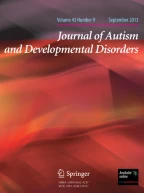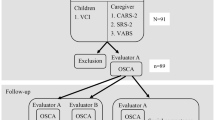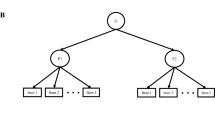Validation of the Emotion Regulation and Social Skills Questionnaire for Young People with Autism Spectrum Disorders

The current study aims to evaluate the psychometric properties of the Emotion Regulation and Social Skills Questionnaire (ERSSQ), a rating scale designed specifically to assess the social skills of young people with Autism Spectrum Disorder (ASD). The participants were 84 children and young adolescents with ASD, aged between 7.97 and 14.16 years with a mean IQ score of 90.21 (SD = 18.82). The results provide evidence for the concurrent and criterion validity of the ERSSQ Parent form, and the concurrent validity of the ERSSQ Teacher form. The clinical and theoretical implications are discussed, including the necessity of ratings across multiple contexts and the potential use of the ERSSQ in identifying individuals most in need of intervention and for planning and assessing the outcomes of social skills interventions.
This is a preview of subscription content, log in via an institution to check access.
Access this article
Subscribe and save
Springer+ Basic
€32.70 /Month
- Get 10 units per month
- Download Article/Chapter or eBook
- 1 Unit = 1 Article or 1 Chapter
- Cancel anytime
Buy Now
Price includes VAT (France)
Instant access to the full article PDF.
Rent this article via DeepDyve
Similar content being viewed by others

Development and Psychometric Examination of a New Social Competence Outcome Measure for Children with Autism Spectrum Disorder: The Observational Social Competence Assessment
Article 27 July 2024

Emotion Regulation in Young Children with Autism Spectrum Disorders
Article 12 November 2016

A Preliminary Psychometric Analysis of the Difficulties with Emotion Regulation Scale (DERS) Among Autistic Adolescents and Adults: Factor Structure, Reliability, and Validity
Article 22 April 2021
References
- American Psychiatric Association (APA) (2000). Diagnositic and statistical manual for mental disorders (4th ed., text rev.). Washington: American Psychiatric Association.
- American Psychiatric Association (APA). (2013). Diagnostic and statistical manual of mental disorders: DSM-5 (5th ed.). Arlington, VA: American Psychiatric Association. Google Scholar
- Australian Bureau of Statistics (ABS). (2008). Census of population and housing: Socio-Economic Indexes for Areas (SEIFA), Australia—Data only, 2006. Canberra: Australian Bureau of Statistics. Google Scholar
- Bacon, A. L., Fein, D., Morris, R., Waterhouse, L., & Allen, D. (1998). The responses of autistic children to the distress of others. Journal of Autism and Developmental Disorders,28(2), 129–142. ArticlePubMedGoogle Scholar
- Barnhill, G. P., & Myles, B. S. (2001). Attributional style and depression in adolescents with Asperger syndrome. Journal of Positive Behavior Interventions,3(3), 175–182. doi:10.1177/109830070100300305. ArticleGoogle Scholar
- Beaumont, R., & Sofronoff, K. (2008). A multi-component social skills intervention for children with Asperger syndrome: The junior detective training program. Journal of Child Psychology and Psychiatry,49(7), 743–753. doi:10.1111/j.1469-7610.2008.01920. ArticlePubMedGoogle Scholar
- Berument, S. K., Rutter, M., Lord, C., Pickles, A., & Bailey, A. (1999). Autism screening questionnaire: Diagnostic validity. The British Journal of Psychiatry: The Journal of Mental Science,175, 444–451. ArticleGoogle Scholar
- Booker, K. W., & Starling, L. (2011). Review of Social Responsiveness Scale (SRS). Assessment for Effective Intervention,36(3), 192–194. ArticleGoogle Scholar
- Broderick, C., Caswell, R., Gregory, S., Marzolini, S., & Wilson, O. (2002). Can I join the club? Autism,6(4), 427–431. doi:10.1177/1362361302006004008. ArticlePubMedGoogle Scholar
- Constantino, J. N., Davis, S. A., Todd, R. D., Schindler, M. K., Gross, M. M., Brophy, S. L., et al. (2003). Validation of a brief quantitative measure of autistic traits: Comparison of the Social Responsiveness Scale with the autism diagnostic interview-revised. Journal of Autism and Developmental Disorders,33(4), 427. ArticlePubMedGoogle Scholar
- Constantino, J. N., Przybeck, T., Friesen, D., & Todd, R. D. (2000). Reciprocal social behavior in children with and without pervasive developmental disorders. Journal of Developmental and Behavioral Pediatrics,21(1), 2–11. doi:10.1097/00004703-200002000-00001. ArticlePubMedGoogle Scholar
- Farrugia, S., & Hudson, J. (2006). Anxiety in adolescents with Asperger syndrome: Negative thoughts, behavioral problems, and life interference. Focus on Autism and Other Developmental Disabilities,21(1), 25–35. doi:10.1177/10883576060210010401. ArticleGoogle Scholar
- Gresham, F. M., & Elliott, S. N. (1990). Social skills rating system. Circle Pines, MN: American Guidance Service. Google Scholar
- Gresham, F. M., & Elliott, S. N. (2008). Social skills improvement system: Rating scales. Bloomington, MN: Pearson Assessments. Google Scholar
- Gresham, F. M., Elliott, S., Cook, C., Vance, M., & Kettler, R. (2010). Cross-informant agreement for ratings for social skill and problem behavior ratings: An investigation of the social skills improvement system-rating scales. Psychological Assessment,22(1), 157–166. ArticlePubMedGoogle Scholar
- Gresham, F. M., Elliott, S. N., Vance, M. J., & Cook, C. R. (2011). Comparability of the social skills rating system to the social skills improvement system: Content and psychometric comparisons across elementary and secondary age levels. School Psychology Quarterly,26(1), 27–44. ArticleGoogle Scholar
- Howlin, P., & Goode, S. (1998). Outcome in adult life for people with autism and Asperger’s syndrome. Autism and pervasive developmental disorders (pp. 209–241). New York, NY: Cambridge University Press. Google Scholar
- Hus, V., Bishop, S., Gotham, K., Huerta, M., & Lord, C. (2013). Factors influencing scores on the Social Responsiveness Scale. Journal of Child Psychology and Psychiatry and Allied Disciplines,54(2), 216–224. doi:10.1111/j.1469-7610.2012.02589.x. ArticleGoogle Scholar
- Lord, C., Risi, S., Lambrecht, L., Cook, E. H., Leventhal, B. L., DiLavore, P. C., et al. (2000). The autism diagnostic observation schedule-generic: A standard measure of social and communication deficits associated with the spectrum of autism. Journal of Autism and Developmental Disorders,30(3), 205–223. ArticlePubMedGoogle Scholar
- Lord, C., Rutter, M., & Lecouteur, A. (1994). Austism diagnostic interview-revised—A revised version of a diagnostic interview for caregivers of individuals with possible pervasive developmental disorders. Journal of Autism and Developmental Disorders,24(5), 659–685. ArticlePubMedGoogle Scholar
- Renk, K., & Phares, V. (2004). Cross-informant ratings of social competence in children and adolescents. Clinical Psychology Review,24(2), 239–254. ArticlePubMedGoogle Scholar
- Rutter, M., Bailey, A., & Lord, C. (2003). Social communication Questionnaire. Los Angeles, CA: Western Psychological Services. Google Scholar
- Sigman, M., & Ruskin, E. (1999). Continuity and change in the social competence of children with autism: Down syndrome, and developmental delays. Monographs of the Society for Research in Child Development,64(1), v–114. ArticleGoogle Scholar
- Sofronoff, K., Attwood, T., Hinton, S., & Levin, I. (2007). A randomized controlled trial of a cognitive behavioural intervention for anger management in children diagnosed with Asperger syndrome. Journal of Autism and Developmental Disorders,37(7), 1203–1214. doi:10.1007/s10803-006-0262-3. ArticlePubMedGoogle Scholar
- Sofronoff, K., Leslie, A., & Brown, W. (2004). Parent management training and asperger syndrome. Autism,8(3), 301–317. doi:10.1177/1362361304045215. ArticlePubMedGoogle Scholar
- Spence, S. H. (1995). Social skills training: Enhancing social competence with children and adolescents: Photocopiable resource book. Windsor: NFER-Nelson.
- Spence, S. H. (2003). Social skills training with children and young people: Theory, evidence and practice. Child and Adolescent Mental Health,8(2), 84–96. ArticleGoogle Scholar
- Tantam, D. (2003). The challenge of adolescents and adults with Asperger syndrome. Child and adolescent psychiatric clinics of North America,12(1), 143–163. ArticlePubMedGoogle Scholar
- Wechsler, D. (1999). The Wechsler Abbreviated Scale of intelligence. San Antonio: Harcourt Assessment. Google Scholar
- White, S. W., Keonig, K., & Scahill, L. (2007). Social skills development in children with autism spectrum disorders: A review of the intervention research. Journal of Autism and Developmental Disorders,37(10), 1858–1868. ArticleGoogle Scholar
Acknowledgments
We would like to acknowledge the cooperation and participation of the Aspect school staff and families in this research, as well as the Australian Research Council who supported this study with a grant (ARC Linkage Grant LP100100052).
Author information
Authors and Affiliations
- School of Psychology, University of New South Wales, Sydney, UNSW, Australia Thomas W. Butterworth
- Child Development Unit, Children’s Hospital at Westmead, Westmead, NSW, Australia M. Antoinette Redoblado Hodge
- School of Psychology, University of Queensland, Brisbane, QLD, Australia Kate Sofronoff & Renae Beaumont
- Centre for Developmental Psychiatry and Psychology, Department of Psychiatry, Southern Clinical School, Monash University, Clayton, VIC, Australia Kylie M. Gray & John R. Taffe
- Autism Centre of Excellence, School of Education and Professional Studies, Griffith University, Mt Gravatt, QLD, Australia Jacqueline Roberts
- Brain & Mind Research Institute, University of Sydney, 94 Mallett St, Camperdown, NSW, 2050, Australia Siân K. Horstead, Kristina S. Clarke, Patricia Howlin & Stewart L. Einfeld
- Centre for Disability Research and Policy, University of Sydney, Lidcombe, NSW, Australia Siân K. Horstead, Kristina S. Clarke, Patricia Howlin & Stewart L. Einfeld
- Thomas W. Butterworth




